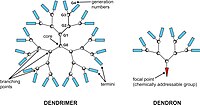
Photo from wikipedia
Abstract Direct delivery of drugs into the nucleus is a promising nanotechnology therapy, since the nucleus is one of the most important organelles controlling cell proliferation and apoptosis. Here, we… Click to show full abstract
Abstract Direct delivery of drugs into the nucleus is a promising nanotechnology therapy, since the nucleus is one of the most important organelles controlling cell proliferation and apoptosis. Here, we report a nucleus-targeting nanocarrier for nuclear drug delivery using a pH/enzyme dual sensitive strategy. The specific ligand PGM (PKKKRKV-GFLG-Mp), composed of nuclear localization sequence (PKKKRKV), enzyme-sensitive tetrapeptide (Gly-Phe-Leu-Gly, GFLG), and pH-sensitive molecules morpholine (Mp), was modified on poly (amidoamine) (PAMAM) by maleimide active polyethylene glycol ester (NHS-PEG-MAL) to form PAMAM-PEG-PGM. Doxorubicin (DOX) was loaded into the cavity of PAMAM to prepare DOX/PAMAM-PEG-PGM. In vitro release study suggested DOX release from DOX/PAMAM-PEG-PGM nanoparticles followed pH and enzyme-triggered manner. In vitro studies showed DOX/PAMAM-PEG-PGM nanoparticles could not only promote cell internalization through the charge switching of morpholine, but also achieve nuclear internalization by the mediation of composite formed by NLS and importin α/β receptor. Further, employing H22 tumour-bearing BALB/c mice as a model, the systemic distribution and anticancer effects of nanoparticles were studied in vivo. The results indicated the nanoparticles could preferentially accumulate in the tumour site in vivo, and the tumour inhibition rate was 88.47%. In short, the nanoparticles developed could be promising in application to nucleus-targeting therapy to enhance antitumour activity.
Journal Title: Pharmaceutical Development and Technology
Year Published: 2022
Link to full text (if available)
Share on Social Media: Sign Up to like & get
recommendations!